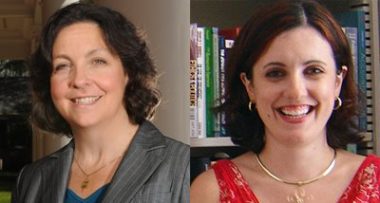Hollywood doesn’t really like government, judging by the movies it produces, but when you look at the way film directors portray individual employees, new research co-authored by an Elon University professor and alumna reveals a lot of on-screen respect for civil servants.

“Are They Ready for Their Close-Up? Civil Servants and Their Portrayal in Contemporary American Cinema,” a study by assistant professor Michelle Pautz ’03 at the University of Dayton and Elon professor Laura Roselle, appears in the latest edition of the journal Public Voices.
The authors argue that looking at cinema is important for understanding how perceptions of government form. Roselle and Pautz note that 1.47 billion movie tickets were purchased in 2007, a figure that doesn’t include movies watched at home, reaching a large percentage of the American population across all demographic lines.
“There has been research about particular films, or a small subset of films, but we could not find in the literature any researchers who had done this large a study on the topic,” Roselle said. “I guess civil servants are not really seen as glamorous. They’re not in the public eye as much, and they’re not elected.”
Using undergraduate students from Elon to help compile data, Roselle and Pautz examined the top 10 grossing films in the United States for each year from 1992-2006. Out of the films that contained some depiction of government, 60 percent painted it as “inefficient, incompetent, and/or bad.”
Of that group, two-third of the films portrayed government negatively because of the “system” rather than individual workers. For example: In Batman Begins, it’s the system that’s incapable of dealing with crime. In Chicago, the ineptitude of the criminal justice system allows Roxie to get away with her crimes.
“Since our founding, Americans have always had an inherent distrust of government. We’ve found that has become even more pronounced since the late 1960s,” Pautz said. “Americans don’t like government. It’s not in our DNA.”
Though government tends to be cast in poor light, the opposite holds true for individual civil servants. Instead, workers were portrayed as “knowledgeable, friendly, and professional,” not to mention “good looking” and “well trained.”
Why does the institution of government catch lots of criticism from film directors while the men and women who work for it are generally shown in a positive manner?
“If you ask your neighbor or friend, and you mention civil servants who do a lot of government work – teachers, firefighters, judges – many people will say ‘Oh my gosh, I love teachers! They work hard! Firefighters? We have to have them!’” Roselle said. “We don’t tend to realize that while we’re hating government, we’re loving the people who are professionals and work for government.”
Adds Pautz: “Generally speaking, our experience with government is largely positive. When you look at films, first responders are heroic, the teachers are good, and public hospital employees are doing a good job and helping people.”
Other highlights from the research include:
• The ratio of male to female federal civil servants is much closer (56 percent male, 44 percent female) in real life than what films portray among all level of government, where 84 percent of civil servants were men.
• Eighty percent of civil servants in the movies are white; African-Americans made up just 6 percent. The remaining 14 percent “ranged from Arab to Hispanic to penguins and apes (primarily in the animation films).”
• A majority of CIA officials (68 percent) were found in films that depicted the government in a negative manner.
Roselle and Pautz didn’t include elected politicians, law enforcement or military personnel in their research since those three groups have been the focus of previous studies. The researchers also noted that the Sept. 11, 2001, terrorist attacks did not affect the portrayal of government in films released in the ensuing years.
Roselle is one of Elon’s most prolific scholars and served as its 2009-10 Distinguished University Professor. Having studied the role of the media in politics for more than two decades, she specializes in international political communication. She recently completed a term as president of the International Communication Section of the International Studies Association and is currently the program chair for the Political Communication Section of the American Political Science Association’s annual Political Communication Conference to be held in Washington, D.C., in September.
Pautz majored in economics, political science and public administration at Elon, then earned her master’s degree and doctorate in public administration from Virginia Tech. She taught for a year at Elon while completing her dissertation before accepting a position at the University of Dayton. It was during that year when Pautz and Roselle started their project.
“I hope this research causes people to step back and think about what government is,” Roselle said. “Government is not an institution outside of ourselves, and there are many people in our community, including civil servants who work for government and are part of government who are competent and intelligent and professional.”


